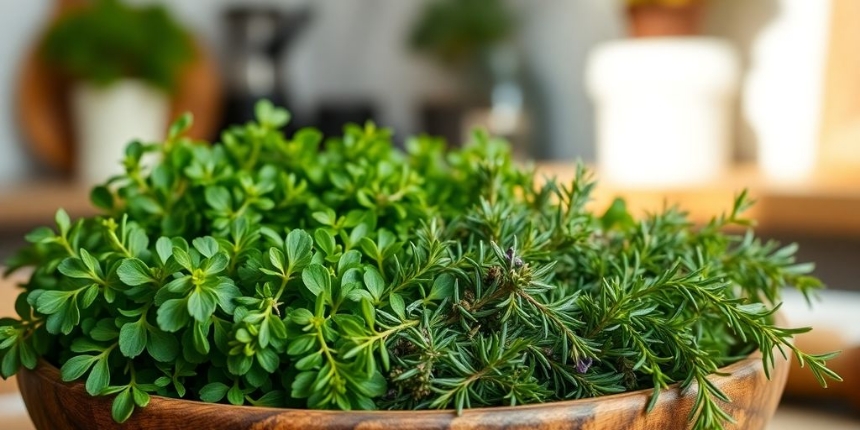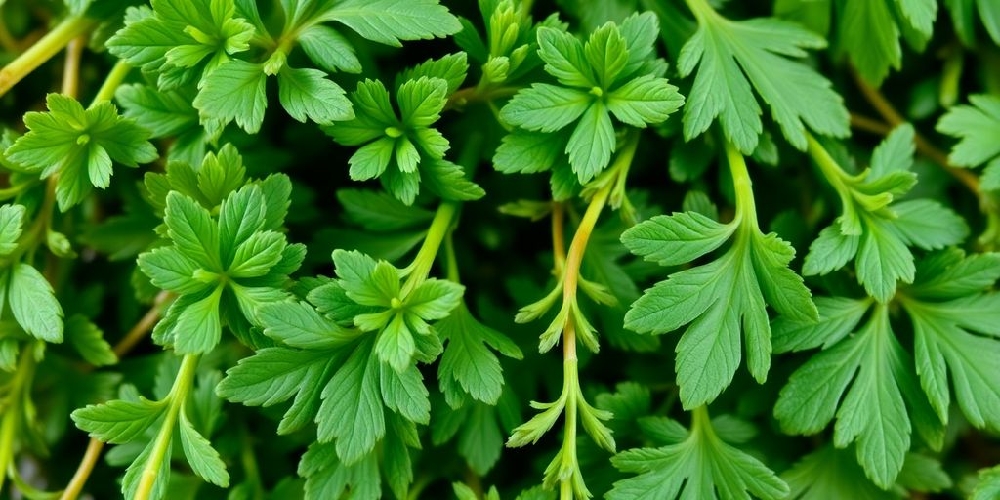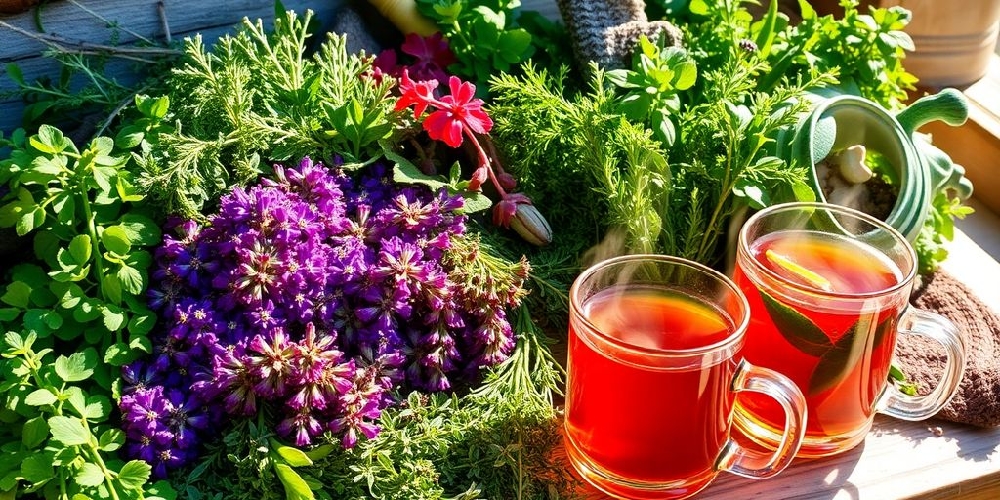
Greek herbs have been a part of the culture for centuries, adding flavor and health benefits to meals and remedies alike. From ancient times, these plants have played a key role in both culinary practices and traditional medicine. In this guide, we’ll explore various herbs that are staples in Greek cooking, their medicinal properties, and how to find them in local markets.
Key Takeaways
- Greek herbs have a long history in both cooking and medicine.
- Ironwort is a unique herb with cultural significance and health benefits.
- Oregano and thyme are essential in Greek cuisine, providing distinct flavors.
- Wild-harvested herbs are often fresher and more flavorful than store-bought.
- Visiting local herb shops in Greece can be a rewarding experience for discovering fresh ingredients.
Exploring The Rich History Of Greek Herbs
Ancient Uses In Medicine
Herbs in ancient Greece weren't just for cooking; they were essential to medicine. Think about Hippocrates, often called the "father of medicine." He really pushed the idea that herbs, along with fresh air and exercise, were key to staying healthy. They used herbs for everything from treating wounds to easing pain. It's pretty amazing how much they relied on these natural remedies.
Culinary Traditions
Greek cuisine is famous for its fresh, vibrant flavors, and a lot of that comes from the herbs they use. Oregano, thyme, dill, and parsley are super common, giving that distinct Mediterranean taste to dishes like Greek salad and tzatziki. These herbs aren't just tasty; they're also packed with antioxidants and other good stuff. It's cool how they've been using these same herbs for centuries.
Mythological Significance
Herbs even popped up in Greek mythology. Mount Olympus, the home of the gods, was said to be overflowing with flowers and herbs for everyone to use. Some herbs were even linked to specific gods or had special powers in myths. For example, oregano's cultural value was significant, often associated with love and joy. It adds a whole other layer to how we see these plants.
The ancient Greeks really valued herbs, seeing them as more than just ingredients. They were part of their medicine, their food, and even their stories. It makes you appreciate them even more.
Key Culinary Herbs In Greek Cuisine
Greek cuisine is really set apart by its awesome use of herbs. It's not just about spices; it's the fresh, vibrant herbs that make the dishes sing. Let's look at some of the key players you'll find in almost every Greek kitchen.
Oregano: The Ubiquitous Flavor
Oregano is the herb of Greece. You just can't escape it, and honestly, you wouldn't want to. It's everywhere, from salads to meat dishes, and it brings this warm, peppery flavor that's just so Greek. It’s often paired with olive oil and lemon juice to create a simple, yet flavorful dressing or marinade. It's not just tasty, though; oregano is packed with antioxidants, which is a nice bonus.
Thyme: A Mediterranean Staple
Thyme is another herb you'll find all over the Mediterranean, and Greece is no exception. It's got this slightly earthy, lemony flavor that works really well with grilled meats, especially lamb. It's also great in soups and stews, adding a depth of flavor that's hard to beat. Plus, like oregano, thyme has some pretty cool health benefits, like antiseptic properties. It's been used for centuries, not just in cooking, but also for its fragrance.
Dill: Freshness In Every Bite
Dill brings a burst of freshness to Greek cooking. It's often used in dishes like tzatziki, where its bright, slightly tangy flavor really shines. You'll also find it in salads and fish dishes, adding a light, refreshing touch. It's one of those herbs that just makes everything taste a little bit brighter and more alive. It's best used fresh, so keep an eye out for it at the markets.
Using these native Greek herbs in your everyday cooking can provide a delicious and totally Greek culinary experience! They are rich in antioxidants and give a typically Mediterranean flavour.
Medicinal Properties Of Greek Herbs
Healing Benefits Of Ironwort
Ironwort, also known as Sideritis, isn't just your average mountain tea; it's been a go-to for generations in Greece for its supposed healing powers. People drink it to help with everything from colds to anxiety. It's packed with antioxidants and is thought to have anti-inflammatory properties. Some studies even suggest it could be good for bone health. It's definitely more than just a tasty beverage.
Herbs In Traditional Remedies
Greek herbalism boasts a rich history, with ancient roots reflected in early European medical texts. Think back to Hippocrates, who emphasized the nutritional value of herbs, fresh air, and exercise for good health. Herbs were the pharmaka of Circe, Medea and Chiron. Today, many Greeks still turn to these traditional remedies. Oregano is used to alleviate respiratory problems, while thyme is known for its antiseptic and antifungal qualities and for easing muscle pain. Dill, on the other hand, is used to soothe headaches. It's amazing how much knowledge has been passed down through the ages.
Modern Uses In Herbal Medicine
While traditional uses are still relevant, modern science is starting to catch up and validate some of these age-old beliefs. Researchers are exploring the potential of Greek herbs in treating various conditions. You can find oregano benefits in supplements and aromatherapy products. The quality and freshness was impressive and many herbs were wild-harvested. Here's a quick look at some modern applications:
- Antioxidant Boost: Many Greek herbs are rich in antioxidants, helping to combat free radicals in the body.
- Anti-inflammatory Effects: Some herbs show promise in reducing inflammation, a key factor in many chronic diseases.
- Digestive Support: Certain herbs are used to aid digestion and relieve gastrointestinal discomfort.
It's important to remember that while herbs can be beneficial, they're not a substitute for medical treatment. Always talk to your doctor before using herbs for medicinal purposes, especially if you have any underlying health conditions or are taking medications.
Ironwort: A Unique Greek Herb

Ironwort, also known as mountain tea (Sideritis spp.), is a staple in Greece, though it's not as well-known outside the Mediterranean. You'll find it in almost every Greek home and cafe. It's more than just a drink; it's a part of Greek culture and tradition.
Cultural Significance
Ironwort isn't just a tea; it's a symbol of Greek hospitality and wellness. It's often the first thing offered to guests, especially during the colder months. The plant's Greek name, sideritis, hints at its historical use. Ancient Greeks believed it could heal wounds inflicted by iron weapons, a belief possibly inspired by the plant's spear-like shape.
Culinary Applications
While primarily consumed as a tea, ironwort can also add a subtle, earthy flavor to certain dishes. It's not a common culinary herb like oregano or thyme, but some innovative chefs are starting to experiment with it. You can sometimes find it used to infuse olive oil or flavor broths.
Health Benefits
Ironwort is packed with antioxidants and has anti-inflammatory properties. People drink it to help with colds, digestive issues, and even anxiety. It's often enjoyed with a squeeze of lemon or a spoonful of honey to enhance its flavor and health benefits.
Drinking ironwort tea is a simple way to enjoy a taste of Greece and potentially boost your well-being. It's a comforting and healthful beverage that has been cherished for centuries.
Here's a quick look at some of the potential health benefits:
- Rich in antioxidants
- May help reduce inflammation
- Traditionally used for colds and digestive issues
Wild-Harvested Herbs In Greece
Sourcing Fresh Ingredients
Finding truly fresh herbs in Greece often means looking beyond the supermarket shelves. Many locals and chefs prefer wild-harvested herbs, believing they possess a more intense flavor and aroma compared to their cultivated counterparts. The key is knowing where to look and who to trust. You can often find these herbs at local farmers' markets or through direct contact with villagers who gather them from the mountains and countryside. It's a great way to support local communities and experience the authentic tastes of Greece.
Seasonal Availability
The availability of wild herbs in Greece is heavily influenced by the seasons. Each herb has its peak harvesting time, which affects its flavor and potency. For example:
- Spring: Dill and parsley are abundant.
- Summer: Oregano and thyme thrive in the hot, dry climate.
- Autumn: Sages and certain mint varieties reach their peak.
- Winter: Some hardy herbs like rosemary can still be found.
Understanding these seasonal variations is important for both culinary and medicinal uses. It ensures you're using the herbs at their best and helps to preserve the natural ecosystem by avoiding over-harvesting during vulnerable periods.
Sustainable Harvesting Practices
Sustainable harvesting is crucial to ensure these wild herbs continue to thrive for generations to come. It involves:
- Only taking what you need and leaving enough for the plant to regenerate.
- Avoiding harvesting from protected areas or endangered species.
- Using proper tools and techniques to minimize damage to the plant and its surroundings.
- Respecting the local ecosystem and avoiding trampling or disturbing wildlife.
When buying wild-harvested herbs, ask vendors about their harvesting practices. Supporting those who prioritize sustainability helps protect Greece's rich herbal heritage. You can find high quality Greek oregano that is handpicked.
Herb Shops And Markets In Greece
Greece is a treasure trove for anyone interested in herbs, and the local shops and markets are the perfect place to explore this rich tradition. Forget the supermarket spice aisle; here, you'll find vibrant, fragrant herbs that are often wild-harvested and bursting with flavor. I remember my first time wandering through a market in Athens – the sheer variety was overwhelming, but in the best way possible.
Must-Visit Locations
When you're on the hunt for Greek herbs, there are a few places you absolutely have to check out. Athens, in particular, has some fantastic herb shops clustered around Evripidou Street, near Monastiraki station. These aren't your typical tourist traps; they're where locals go to stock up on their favorite ingredients. Don't be afraid to venture beyond the capital, though. Local markets in smaller towns and villages often have stalls selling herbs directly from the people who grow or gather them. It's a great way to support local communities and get a taste of authentic Greek life.
What To Look For
So, you're in a Greek herb shop, surrounded by unfamiliar names and aromas. Where do you start? First, look for the classics: oregano, thyme, and dill. These are staples of Greek cuisine, and you'll want to have them on hand for cooking. Beyond that, keep an eye out for unique herbs like dittany (especially if you're in Crete) and sideritis (mountain tea). Don't be afraid to ask the shopkeeper for recommendations – they're usually incredibly knowledgeable and happy to share their expertise. Also, pay attention to the form of the herbs. In Greece, you'll often find them sold whole, rather than pre-ground, which means they'll retain more of their flavor and aroma.
Tips For First-Time Buyers
Buying herbs in Greece can be a bit different from what you're used to, so here are a few tips to help you navigate the experience:
- Do a little research beforehand. Knowing the Greek names of the herbs you're interested in can be a huge help, as many shopkeepers may not be familiar with the English common names.
- Don't be afraid to ask questions. The shopkeepers are usually very knowledgeable and happy to help you find what you're looking for.
- Check for freshness. Look for herbs that are vibrant in color and have a strong aroma. Avoid anything that looks dull or smells musty.
Exploring herb shops and markets in Greece is more than just a shopping trip; it's an immersion into the country's culture and traditions. Take your time, savor the aromas, and enjoy the experience. You're sure to discover some new favorite flavors along the way.
Infusions And Teas From Greek Herbs

Popular Herbal Teas
Greek herbal teas are more than just a beverage; they're a cultural experience. Mountain tea, or Tsai tou Vounou, is probably the most well-known, and you'll find it everywhere. It's got a mild flavor, and people usually drink it in the winter with lemon or honey. Then there's dittany, a Cretan herb with a savory taste, somewhere between marjoram and sage. It's even considered an aphrodisiac in some circles! Don't forget chamomile, often enjoyed for its calming properties. You can even find unique blends like Defence, combining Mt. Olympus ironwort, Roselle, Chinese milkvetch, Ginger, Reishi, Licorice, and Pennyroyal.
Brewing Techniques
How you brew your Greek herbal tea can really change the flavor. For mountain tea, it's best to boil it in water – that's called a decoction. Other herbs, like chamomile or dittany, are better when you steep them, like regular tea. The amount of time you steep it for matters too; usually, 5-10 minutes is good, but you can adjust it to your taste. And don't be afraid to experiment with adding honey, lemon, or even a cinnamon stick to spice things up.
Health Benefits Of Herbal Infusions
Greek herbs aren't just tasty; they're packed with good stuff. Oregano, when consumed as an infusion, is said to help with respiratory issues. Thyme is known for its antiseptic and antifungal qualities, and it can even ease muscle pain. Dill is used to soothe headaches. Mountain tea is full of antioxidants, comparable to green tea. It's like drinking a cup of wellness!
Drinking herbal infusions is a time-honored tradition in Greece, with many believing in their healing properties. While not a substitute for medical treatment, these teas can be a comforting and potentially beneficial addition to your daily routine.
Here's a quick look at some common herbs and their potential benefits:
- Mountain Tea: Antioxidant and anti-inflammatory properties.
- Dittany: Reputed aphrodisiac and digestive aid.
- Chamomile: Calming and sleep-promoting effects.
- Thyme: Antiseptic and muscle pain relief.
Wrapping It Up
So there you have it—a peek into the world of Greek herbs. These plants are more than just flavor boosters; they carry a rich history and a ton of health benefits. Whether you’re whipping up a classic Greek dish or just looking to add some zest to your meals, these herbs can really make a difference. Don't be afraid to experiment with them in your cooking. And if you ever get the chance to visit Greece, definitely check out the local markets. You might just find some fresh herbs that will inspire your next culinary adventure. Happy cooking!
Frequently Asked Questions
What are some common herbs used in Greek cooking?
Some popular herbs in Greek cooking include oregano, thyme, dill, and parsley. These herbs add great flavor to many dishes.
How are Greek herbs used in traditional medicine?
Greek herbs have been used for centuries in traditional medicine to help with various health issues. For example, thyme is known for its antiseptic properties, while dill can help with digestion.
Where can I buy Greek herbs?
You can find Greek herbs at elenianna.
What is Ironwort and why is it special?
Ironwort, also known as Sideritis, is a unique Greek herb valued for its health benefits and is often used to make herbal tea.
How can I use Greek herbs in my cooking?
You can use Greek herbs fresh or dried to season meats, fish, salads, and soups. They can also be brewed into teas.
Are there any health benefits to drinking herbal teas made from Greek herbs?
Yes, many herbal teas made from Greek herbs offer health benefits, such as improving digestion and boosting the immune system.
